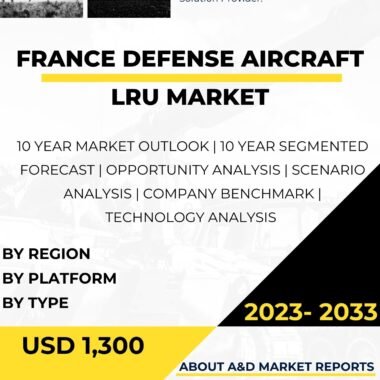Description
The Saudi Arabia Defense Avionics Market is a critical sector within the country’s defense industry, focusing on the procurement, development, and integration of advanced electronic systems used in military aviation platforms. Avionics encompasses a wide range of technologies that enhance the performance, safety, and mission capabilities of aircraft, including navigation, communication, surveillance, display systems, and electronic warfare equipment.
As a prominent player in the Middle East region, Saudi Arabia places significant emphasis on maintaining a modern and well-equipped defense force to safeguard its national security interests and contribute to regional stability. The Saudi Arabian Air Force (RSAF) operates a diverse fleet of military aircraft, including fighter jets, transport planes, and helicopters, all of which require sophisticated avionics systems to meet operational requirements.
The Saudi Arabia Defense Avionics Market is dominated by international aerospace and defense companies that specialize in avionics technology development and manufacturing. These companies, such as Boeing, Lockheed Martin, Raytheon, and Thales, among others, provide a wide range of avionics solutions for both fixed-wing and rotary-wing platforms. Their offerings include advanced radar systems, communication suites, electronic countermeasures, and avionics integration services.
One of the primary drivers of the Saudi Arabia Defense Avionics Market is the RSAF’s ongoing modernization efforts. The Kingdom continually seeks to upgrade its military aircraft with cutting-edge avionics technologies to maintain a technological edge over potential adversaries. Upgrading avionics systems can significantly enhance aircraft performance, situational awareness, and operational capabilities, improving the RSAF’s ability to respond to emerging threats and challenges.
Additionally, Saudi Arabia’s participation in regional and international military operations has underscored the importance of advanced avionics systems. The RSAF’s involvement in operations such as the Saudi-led intervention in Yemen and international military exercises highlights the need for reliable and capable avionics to ensure mission success and the protection of military personnel.
The Saudi government’s Vision 2030 economic diversification plan also influences the Defense Avionics Market. As part of this vision, Saudi Arabia aims to develop a robust domestic defense industry capable of contributing significantly to the national economy. This includes fostering partnerships and joint ventures with international avionics companies for technology transfer and knowledge sharing.
Localization of defense manufacturing is a key objective for the Saudi government to reduce reliance on imports and increase self-sufficiency in producing critical defense equipment. By developing indigenous avionics capabilities, Saudi Arabia seeks to bolster its technological prowess and create high-skilled job opportunities for its citizens.
The advancement of military aviation technologies, including unmanned aerial vehicles (UAVs) and drone systems, has also impacted the Saudi Arabia Defense Avionics Market. As the use of UAVs becomes more prevalent in defense operations, the demand for specialized avionics solutions tailored to these platforms is expected to increase.
However, the Saudi Arabia Defense Avionics Market faces challenges. The complexity of avionics systems and the rapidly evolving technological landscape demand continuous research and development efforts to stay at the forefront of innovation. Furthermore, avionics technologies often require compliance with stringent international regulations and standards, which can add complexities to procurement and integration processes.
Moreover, the Kingdom’s defense budget can be subject to fluctuations due to changes in geopolitical situations and global economic conditions, impacting procurement patterns and investments in avionics systems.
In conclusion, the Saudi Arabia Defense Avionics Market is a crucial component of the country’s defense industry. As the Kingdom continues its efforts to modernize its military aviation capabilities and enhance its defense readiness, the demand for advanced avionics systems is expected to grow. International aerospace and defense companies will continue to play a significant role in this market, but the Saudi government’s focus on economic diversification and indigenous defense industry development will drive increased collaboration and technology transfer initiatives. By leveraging advanced avionics technologies and promoting local research and development, Saudi Arabia aims to build a robust and self-sufficient defense avionics sector, ensuring its military remains operationally effective and prepared to meet future challenges.




